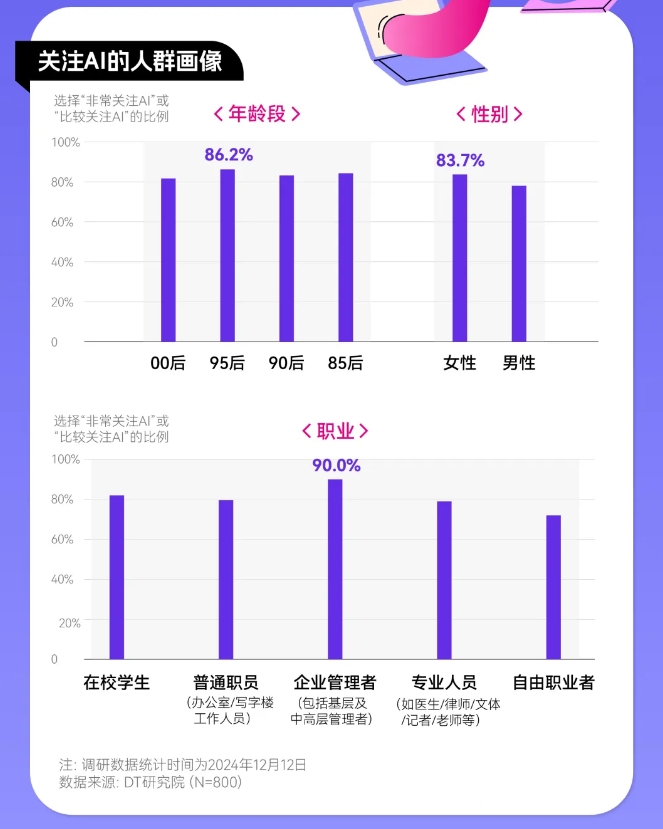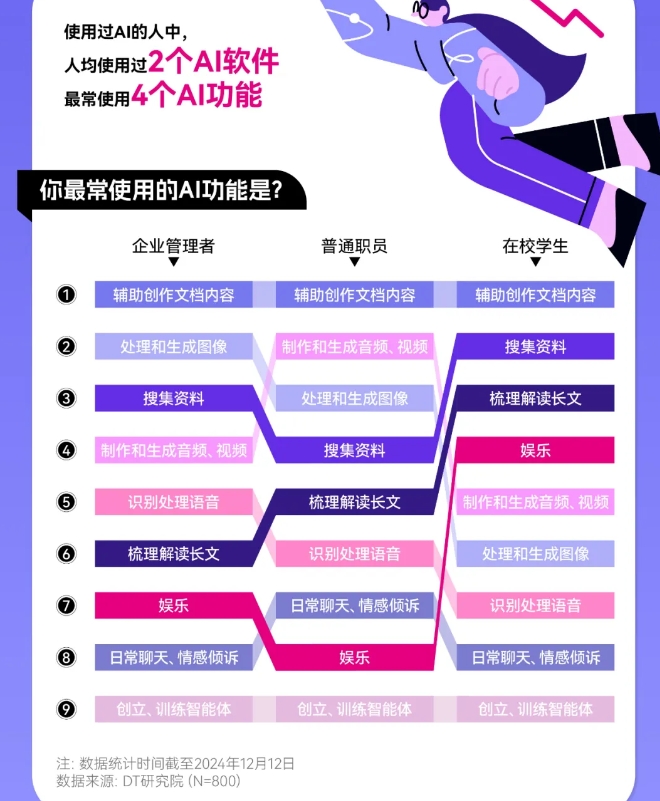AI Usage Trends Report 2024: Young People's Growing Interest
2024 AI Usage Trends Report: Insights into Young People's Engagement with AI
According to the 2024 Trends Report on AI Usage Among Young People, artificial intelligence (AI) has become ubiquitous, influencing various aspects of life, from professional tasks to personal projects and even social interactions.
The report notes a marked increase in interest in AI among individuals born in the 1980s and 1990s, with post-95s (those born after 1995), women, and corporate managers showing the highest engagement levels. Notably, over 80% of respondents expressed strong interest in AI tools for various applications, including text, painting, audio, and video. Furthermore, nearly half of the participants reported using AI tools on a daily basis, signifying their essential role in modern work and life.

Among AI users, the average individual utilizes two AI software applications, accessing a variety of features. Those with extensive workplace experience are particularly inclined towards generative AI functions, which assist in document creation, image processing, audio/video production, and speech recognition. Conversely, students primarily leverage AI for content creation, information gathering, and interpreting lengthy texts to support their educational needs.
The survey results highlight a generally positive perception of AI-generated content, with “interesting” being the most common feedback. College students often use AI for brainstorming and turning creative ideas into reality, while white-collar workers tend to view AI as a “substitute for experts,” seeking advice in fields such as law, health, fitness, and travel.
Over 70% of respondents are eager to learn more about AI, with a particular focus on mastering AI prompts and refining instructions. Among students, 8% have already invested in paid learning opportunities related to AI, reflecting their awareness of the growing demand for AI skills in the workforce.
AI's applications extend beyond practicality into the realms of entertainment and creative expression. Young people frequently engage with AI for activities such as cyber tarot readings, astrology, and generating memes and videos, attributing its popularity to both ease of use and the fun factor.
In terms of emotional support, nearly 60% of participants believe AI can help alleviate anxiety and provide companionship. Younger generations, particularly the post-00s demographic and women, are more inclined to engage in meaningful conversations with AI. Additionally, AI is perceived as a “parenting tool” by many post-95 parents, highlighting its role in addressing their children's communication needs.

AI's advantages are also evident in travel planning and translation, especially during peak travel seasons. With the resurgence of outbound tourism, the usage of AI translation tools has seen significant growth.
Despite the heightened expectations for AI-generated content compared to the previous year, there is a notable increase in “wait-and-see,” “cautious,” and “vigilant” attitudes toward AI, particularly concerning data privacy issues. The majority of respondents indicated a willingness to recommend AI tools, provided that these tools ensure high security and do not compromise personal or sensitive information.
AI is increasingly recognized as a crucial tool for enhancing personal competitiveness. Individuals are actively seeking ways to use AI more effectively while remaining vigilant about the potential risks associated with the technology. As AI technology continues to evolve, its applications are expected to broaden and deepen in various domains.
Key Points
- Over 80% of young respondents show strong interest in AI tools.
- Students primarily use AI for educational content creation and information gathering.
- AI is viewed positively, offering emotional support and creative opportunities.
- There is growing concern regarding data privacy and security in AI usage.
- Users are eager to learn more about AI applications and improve their skills.